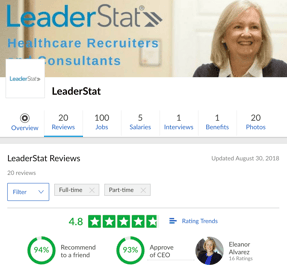
That’s all the attention your resume will get from a hiring manager before they put it in the “no-thanks” versus the “deserves-a-closer-look” pile.
Your resume is the primary connection between you and hiring managers, but unless it's highlighting the right skills and strengths, you might be missing out on getting that closer look. Whether you're actively searching for a new job or you're looking to make a major career change, it can be challenging to know where to start when it comes to updating your resume.
Use the following resume tips to make sure you start off your application with a great first impression.
Remove anything that can be used to discriminate against you, like religious and political views.
It is also smart to consider removing dates from any relevant education or certifications. If it's obvious the employer is looking for highly-experienced, seasoned professionals, leave them in if they reflect that. However, our executive healthcare recruiters recommend leaving dates out and focusing on experience.
No matter how well-written, your resume won't be thoroughly read the first time, it will probably only be skimmed over.
Make sure your best experiences and accomplishments are visible on the top third of your resume. This top section is what the hiring manager is going to see first—and what will serve as a hook for someone to keep on reading.
Focus on putting your best, most relevant experiences first and use these additional resume tips to make your resume easy to digest:
A common resume mistake is making too many general claims about your experience.
Adding specific numbers to your resume is a great way to prove that you have legitimate experience and accomplishments in your work history. Not all of your achievements will be quantifiable, but many of them will be.
Your goal is to figure out which numbers are the most crucial to your success and the best way to frame your achievements.
%20(1).png?width=692&name=Untitled%20design%20(7)%20(1).png)
Unless you are changing industries and need to explain why your experience doesn’t match up with the position you’re applying to, you do not need to include an “objective.”
Hiring managers know why you are applying - you want the job!
Many companies use an applicant tracking system (ATS) software to screen resumes, meaning a resume must contain the right keywords to be chosen by the application’s algorithm. Many companies and recruiters use this software as a tool to narrow the job applicant pool.
You have to provide enough information, focusing on relevant keywords specific to your profession, to make the first cut.
It’s important to include keywords from the job description in your resume—but don’t go overboard. Recruiters can spot “keyword stuffing” a mile away.
Before you start to work on writing or updating your resume, review resume examples that fit a variety of employment situations or job types, like these tips for a nursing home administrator resume or these nurse manager resume tips. This will help you select a style and format that best highlights your strengths and achievements.
Your resume grabbed the hiring manager's attention and you just landed an interview for the job. Now what? Making a good impression and nailing your interview is critical if you want to get the job. Use these interview preparation tips to ace the interview!
Research should always be your first step after accepting an interview. Gathering background information on employers is crucial for successful interview preparation. Learning more about the company not only helps you know more about where you could be working but it helps answer the questions the employer will inevitably have, like, "Why do you want to work here?"
Knowing as much as possible about the company's history and plans for the future can also help you show how you can add value to the company.

Some places to research the company include:
Another option for research can come from your own connections. If you know a current employee or someone who can refer you to a current or former employee, you’ll be able to gather additional information that can give you an advantage over the other applicants.
This also gives you a chance to get first hand opinions about the interview process they went through when they were hired and what they do or don't like about working for the company.
The more information you can gather, the more comfortable you’ll feel while you’re talking to your interviewer.
The most important thing you can do prior to an interview is review your work history. Then, think of all the questions you may be asked and practice responses that are truthful, complete and concise. Again, make sure you find ways to quantify your accomplishments with metrics to demonstrate the clear value.
Once you've researched the company and have an idea of the questions you may be asked, hold a few practice interviews. Practice in the mirror, with your spouse, friend or anyone else available. Just keep in mind that you'll need a tough critic who won't gloss over your slip-ups. You can also record or videotape your responses, and then review your answers and check your body language.
Not only should you practice answering interview questions, but you should also prepare questions that you want to ask the person interviewing you. This gives you an opportunity to learn more about the company and the position, and if they're a good fit for you.
Some examples of good questions to ask during a job interview:
The more you practice, the more self-assured you will feel walking into the interview. Your answers will feel natural and interviewers will be impressed by your confidence.
Prepare For Other Types Of Interviews
It is important to know what type of interview you will have, so you can effectively prepare. While you may expect a standard, in-person interview, you could be asked to participate in a video or phone interview, or even a group interview.
Phone or video interviews can be tricky because you have to rely on technology for your communications. For both, make sure you have a quiet place to interview, a time when you won’t be interrupted and the technology necessary to smoothly handle the meeting.
Tips for Phone Interviews:
For phone interviews, having access to a landline is best but if you plan to use your cell phone or a headset, call a friend and have them check the sound quality.
Practice overcoming the drawbacks of the phone interview by pretending you are face-to-face. It’s easy to sound bored on the phone, so smile, nod and gesture with your hands as you normally would in person – this energy will come across in your voice.
It's also much easier to interrupt someone over the phone versus in person, so make sure the interviewer is finished talking before jumping in. Take time to gather your thoughts for your responses, but don't stay silent for too long or it can create awkward dead air.
.jpg?width=960&name=Phone-Interview-Tips-960x410%20(1).jpg)
Tips for Video Interviews:
Some employers like to use video calling, like Skype or Zoom, for the first interview. It's a nice middle ground between in-person and phone interviews. Many of the phone interview tips apply for video, but there are a few additional steps you should take to prepare.
Set up your camera or laptop in the place you plan to do the interview. Make sure it's positioned so that you're looking directly at the camera and that whatever is in the background isn't messy or distracting.
Another overlooked part of video interviews is dress code. While you may think you only need to dress the part from the waist up, what happens if you need to get up for any reason? Those polar bear pajama pants you have on with your blazer may not leave the best impression.
With both phone and video interviews, take your time to make sure everything is in working order, do a trial run, and keep your resume and notes close so you’re ready when it’s time for the actual interview.
Another type of interview that requires special preparation is a group interview.
This is where you are either interviewed by a panel or with a group of several candidates.
For this type of interview, you want to practice answering questions and being a good listener. Be ready to thoughtfully respond to several interviewers if being interviewed by a panel, or to be attentive and actively listen to other candidates.
You want to make sure your voice is heard during the interview, but you also do not want to dominate the conversation. When there is an opportunity to speak, do so, but do not cut off other people or appear too impatient and competitive. A helpful trick is to try to quickly learn the names of the candidates/interviewers and address them when you do speak up.
Make sure you are prepared for any type of interview before you arrive. If you are unsure, do not hesitate to ask the employer or recruiter who set up the meeting.
You will want to decide what to wear before the day of the interview. Your first impression is very important and you want to make sure you look professional and appropriate for the work environment.
For formal business interviews, men tend to wear a dark suit and tie and women often wear a dark suit or a blouse with dark pants or a skirt.
If you are unsure about what to wear, email or call the person who scheduled the interview and ask about the typical dress code. It is always a good idea to dress a bit more professionally than the dress code requires. Your goal is to make the best impression possible.
What? After all that? Yes.
You don't want to come off like a robot in your interview. You practiced so that your responses feel natural, and they should. You want to work somewhere that likes you, not just your interview responses.
Take a deep breath, show up early and get ready to wow during your interview.
Today is the day, you're about to nail your interview.
Now that you've prepared and practiced, it's time to put that to the test. Start ahead by giving yourself extra time before the interview. Show up at least 15 minutes early, give yourself time for traffic or parking and take a deep breath to calm your nerves.
If you’re running late, you’ll be stressed and that’s no way to start an interview for what could be your new job.
It’s not just the person interviewing you who makes the decision of if you make the cut. Be polite and gracious to everyone you meet from the time you walk in the door to when you leave. When you arrive, introduce yourself to the receptionist.
Make sure you know the interviewer's name and use it as soon as possible during the interview. The people you meet could be your future co-workers, so make the best impression that you can.

Common mistakes could be the downfall to your interview. Make sure you don't face any setbacks by avoiding things like:
These mistakes may seem small, but they could make or break your interview and you should be sure to avoid them at all costs.
On a lighter note, don't make any of these interview mistakes, either. And yes, these are based on true horror stories from LeaderStat's Tales from the Nightmare Interview Crypt.
Don't:
Tough interview questions can trip up even the most seasoned interviewee. Still, it is best to adopt a ‘the interviewer is always right,’ attitude: control your facial expressions and act as though you’ve just been asked something reasonable, even if you haven’t (e.g. if you were a plant, which one would you be?).
Here are some specific tips on how to handle tough interview questions:
Question 1: Can you tell me a little bit about yourself?
This is when you have a chance to sell yourself. Give a concise answer about your professional goals and how you can be an asset to the interviewer’s organization.
Question 2: What would you like me to know about you that's not on your resume?
This might either be the grasping question of an inexperienced interviewer, or it might be an intentionally thrown curve ball to see if you can adapt your swing, so be careful with your answer. All your professional accomplishments should already be on your resume, so this answer should focus on how your attitude and personality contribute to your effectiveness in your job.
Question 3: Why do you want to work here?
Your answer should showcase how you can be an asset for the company and how your professional goals align with the organization. This is where all of that the pre-interview research comes in.
Sometimes, you're able to tell right away that an interview isn’t working out. The chemistry between you and the hiring manager may not feel quite right. You may even know as soon as the interviewer starts explaining the job.
During your other interviews, it may not be as clear. Here are some signs that your job interview went well. If it didn’t, consider it a learning experience and continue to practice. With every interview you're a part of, you’ll be better prepared to ace the next one — and get the job!
After any interview, take time to follow up. This is your chance to really anchor your name on their list of candidates. End the interview with a thank you to the interviewer and reiterate your interest in the position.
Then, follow up with a personal thank you note or email message that reaffirms your interest within a few days of your interview. This is also a chance to remind the employer of your qualifications and to include any details you forgot to mention in the interview.
Another pro tip: use this as a chance to slip in a reference to something notable that happened during the interview. This could be a joke, an unanswered question, an interesting talking point – whatever the case, it shows you remembered the details.
LeaderStat recruiters stress that successful candidates prepare for and plan all parts of the interview: before, during and after.
Take heed of these interview tips, be confident and be yourself. You’ve got this!


LeaderStat specializes in interim management, executive recruiting and consulting for healthcare organizations.
Now that you're prepared for an interview, fill out the form to receive the latest job opportunities and openings - delivered to your email inbox.
Fax: 614.839.7827
Fax: 614.839.7827
Fax: 614.839.7827
Toll Free: 877.699.7828
© 2022 LeaderStat. All Rights Reserved.